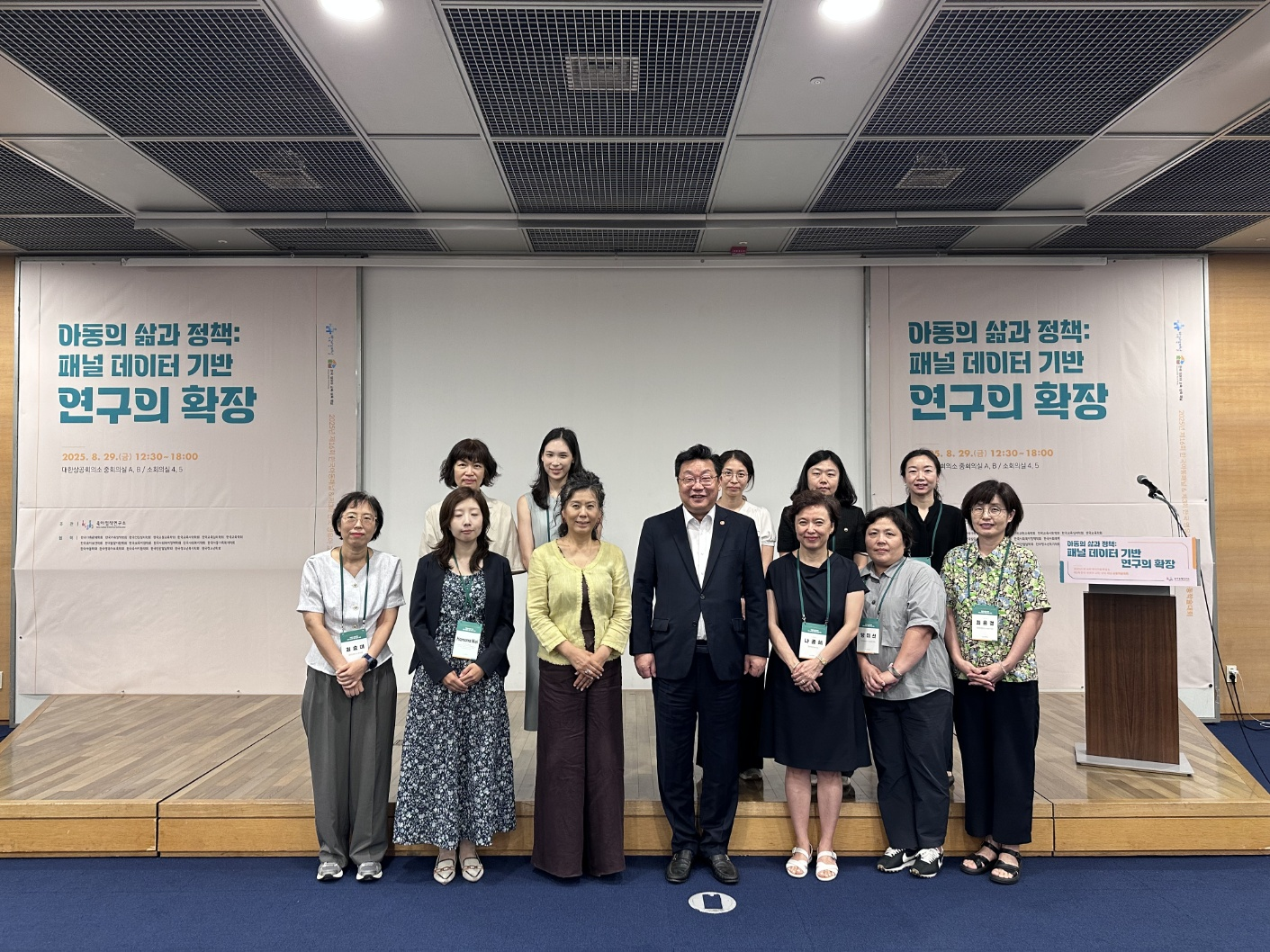Events
- Events
- Seminars
Seminars
- Date
- 2025.09.03
- Writer
- 주송희
- Hit
- 132
The Korea Institute of Child Care and Education (KICCE), led by President Ock Kyeung Hwang, held the 16th Panel Study on Korean Children (PSKC) and the 3rd Korean ECEC Panel Study Joint Conference on Friday, August 29, 2025, at the Korea Chamber of Commerce and Industry (KCCI). Under the theme “Children’s Lives and Policy: Expanding Research Based on Panel Data,” the event featured one keynote and 16 research papers across six sessions, bringing together over 100 scholars, research professionals, and field practitioners to discuss new directions in child and family studies and policy.
The PSKC is a long-term national panel study that has followed a cohort of children born in 2008 (now in their second year of high school) and will continue tracking them into early adulthood through 2027. The Korean ECEC Panel Study began during the prenatal period in 2021 and follows children born in 2022 (now age 3) to examine their development and surrounding environments.
At the opening ceremony, President Ock Kyeung Hwang remarked that this first joint conference of the two panels is highly meaningful in providing a foundation for longitudinal understanding of children’s lives and for generating policy implications. Congratulatory remarks were delivered by Joo Hyung-hwan, Vice Chairperson of the Presidential Committee on Low Fertility and Aging Society; Chung Ik-joong, Director of the National Center for the Rights of the Child (NCRC); and Dr. Han-Suk Kim, Chairman of the Board and CEO of The Korean Pediatric Society (KPS).
In the keynote, Professor Mai Hamana of the Center for Early Childhood Development, Education, and Policy Research (CEDEP), Graduate School of Education, The University of Tokyo, introduced a large-scale longitudinal study on early childhood education supported by Japan’s Ministry of Education, Culture, Sports, Science and Technology, offering comparative perspectives with similar overseas studies.
KICCE researchers shared empirical findings underscoring practical policy implications for child and family policy based on panel data:
Misun Yang, Senior Research Fellow presented “Comparing Trends in Infant Development and Household Characteristics: Evidence from the PSKC and the Korean ECEC Panel Study,” highlighting the need to closely examine changes in caregiving environments by comparing children born in 2008 and 2022. Notably, fathers agreeing that “doing one’s best for one’s children is a parental duty” increased (51.4% → 54.5%). While instrumental values attached to children declined (fathers: 3.26 → 2.69; mothers: 4.49 → 2.19), emotional values rose (fathers: 2.97 → 4.46).
Hyo Mi Choi, Research Fellow reported in “Trajectories of Life Satisfaction Using PSKC Data and Policy Implications” that children’s life satisfaction declines as they grow older (Grade 4: 2.72 → Grade 8: 2.18). Among influencing factors, household income correlates with mothers’ life satisfaction but shows no direct differences in children’s life satisfaction, whereas academic achievement and parent-child attachment affect both mothers’ and children’s life satisfaction—underscoring the need to strengthen psychological and social supports for children.
Yun-Jin Bae, Research Fellow presented “Policy Implications from Research on the Work Environments of Parents with Infants Using Korean ECEC Panel Data,” emphasizing that parents’ work conditions are crucial not only for work–life balance but also for family relationships and child development. The presentation proposed measures to improve child-rearing support policies, including better accessibility and awareness of support programs, expansion of flexible work and childcare time systems, and stronger incentives for family-friendly workplaces.
The academic program comprised six sessions: △Infant Development △Caregiving Environment △Trajectories of Socio-Emotional Development △Adolescent Development and Executive Functions △Education & Care Environments △Best Papers from the Graduate Student Paper Competition.
KICCE noted that the joint conference was significant in offering a longitudinal view of children’s lives and in deriving policy implications based on analyses from the two panel studies.

- PREV
- The 1st Infant and Toddler Future Forum 2025
- 주송희
- 2025.09.03
- NEXT
- No next article.